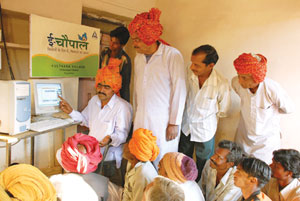As a Company that continuously strives to be ‘Citizen First’, ITC attaches significant importance to its responsibility to contribute to the ‘Triple Bottom Line’, namely the augmentation of economic, environmental and social capital. This commitment finds expression in the Company’s sustainable development philosophy, which recognises the need to not only preserve but also enrich precious environmental resources while providing a safe and healthy workplace for its employees.
ITC’s social development initiatives harmonise the Company’s endeavour to create shareholder value with making a substantial contribution to society. The thrust of the Company’s social sector investment is in four areas: (a) Web-enablement of the Indian farmer through the e-Choupal initiative; (b) Natural resource management, which includes wasteland, watershed and agriculture development; (c) Sustainable livelihood creation, comprising genetic improvement in livestock productivity and women’s economic empowerment; and (d) Community development, with focus on primary education and health & sanitation. |
|
Web-Enablement Of The
Indian Farmer: The e-Choupal Initiative
ITC’s pioneering e-Choupal initiative is a powerful illustration of linking business purpose with a larger societal purpose. The e-Choupal leverages the power of the Internet to empower the small and marginal farmer with a host of services related to know-how, best practices, timely and relevant weather information, transparent price discovery, and much more. This digital infrastructure is also increasingly being used for channelising services related to credit and insurance and can be extended to areas such as health, education and entertainment.
 It can also serve as a strong foundation for linking small and marginal farmers to futures markets to facilitate farmer risk management. The access to e-Choupals, within walking distance from the farm gate, is supplemented through physical infrastructure - the ITC Choupal Saagar - which functions as a hub for a cluster of villages within tractorable distance. These made-to-design hubs also serve as warehouses, and as rural hypermarkets for a variety of goods. In effect, the e-Choupal infrastructure is potentially an efficient delivery channel for rural development and an instrument for converting village populations into vibrant economic organisations. It can also serve as a strong foundation for linking small and marginal farmers to futures markets to facilitate farmer risk management. The access to e-Choupals, within walking distance from the farm gate, is supplemented through physical infrastructure - the ITC Choupal Saagar - which functions as a hub for a cluster of villages within tractorable distance. These made-to-design hubs also serve as warehouses, and as rural hypermarkets for a variety of goods. In effect, the e-Choupal infrastructure is potentially an efficient delivery channel for rural development and an instrument for converting village populations into vibrant economic organisations.
The network currently comprises 6,500
e-Choupals reaching out to more than 4 million farmers in 40,000 villages in the states of Madhya Pradesh, Uttar Pradesh, Haryana, Uttaranchal, Rajasthan, Maharashtra, Karnataka, Andhra Pradesh and Kerala. |